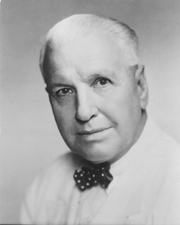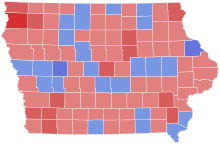
The 1984 United States Senate elections were held on November 6, with the 33 seats of Class 2 contested in regular elections. They coincided with the landslide re-election of President Ronald Reagan in the presidential election. In spite of the lopsided presidential race, Reagan's Republican Party suffered a net loss of two Senate seats to the Democrats, although it retained control of the Senate with a reduced 53–47 majority. Democrats defeated incumbents in Illinois and Iowa, and won an open seat in Tennessee, while Republicans defeated an incumbent in Kentucky.

The 1978 United States Senate elections were held on November 7, in the middle of Democratic President Jimmy Carter's term. The 33 seats of Class 2 were contested in regular elections. Special elections were also held to fill vacancies.

The 1972 United States Senate elections were held on November 7, with the 33 seats of Class 2 contested in regular elections. They coincided with the landslide re-election of Republican President Richard Nixon. Despite Nixon's landslide victory, Democrats increased their majority by two seats. The Democrats picked up open seats in Kentucky and South Dakota, and defeated four incumbent senators: Gordon Allott of Colorado, J. Caleb Boggs of Delaware, Jack Miller of Iowa, and Margaret Chase Smith of Maine. The Republicans picked up open seats in New Mexico, North Carolina, and Oklahoma, and defeated one incumbent, William B. Spong Jr. of Virginia.

The 1958 United States Senate elections were elections for the United States Senate which occurred in the middle of President Dwight D. Eisenhower's second term. Thirty-two seats of Class 1 were contested in regular elections, the new state of Alaska held its first Senate elections for its Class 2 and 3 seats, and two special elections were held to fill vacancies.

The 1932 United States Senate elections coincided with Democrat Franklin D. Roosevelt's landslide victory over incumbent Herbert Hoover in the presidential election. The 32 seats of Class 3 were contested in regular elections, and special elections were held to fill vacancies.

Patrick Grassley is the Iowa State Representative from the 57th District. A Republican, Grassley has served in the Iowa House of Representatives since 2007, and as speaker of the chamber since 2020. Grassley is the grandson of U.S. Senator Chuck Grassley.

The 1924 United States Senate election in Iowa took place on November 4, 1924. Incumbent Republican Senator Smith W. Brookhart ran for re-election to a full term in office against Democrat Daniel F. Steck.

The 1942 United States Senate election in Iowa took place on November 3, 1942. Incumbent Democratic Senator Clyde Herring ran for re-election to a second term but was defeated by Republican Governor George A. Wilson.

The 1938 United States Senate election in Iowa took place on November 8, 1938. Incumbent Democratic Senator Guy M. Gillette, who won a special election to complete the unexpired term of Richard Louis Murphy, won a full term in office by defeating Republican former Senator Lester J. Dickinson. Gillette and Dickinson had briefly served together in the final months of 1936.

The 1948 United States Senate election in Iowa took place on November 2, 1948. Incumbent Republican Senator George A. Wilson ran for re-election to a second term but was defeated by Democratic former Senator Guy Gillette.

The 1950 United States Senate election in Iowa took place on November 7, 1950. Incumbent Republican Senator Bourke B. Hickenlooper was re-elected to a second term in office over Democratic U.S. Undersecretary of Agriculture Albert J. Loveland.

The 1944 United States Senate election in Iowa took place on November 7, 1944. Incumbent Democratic Senator Guy M. Gillette ran for a second full term in office but was defeated by Republican Governor Bourke B. Hickenlooper.

The 1922 United States Senate special election in Iowa took place on November 7, 1922. Republican Smith W. Brookhart was elected to complete the unexpired term of William S. Kenyon, defeating Democrat Clyde Herring.

The 1930 United States Senate election in Iowa took place on November 4, 1930. Incumbent Democratic Senator Daniel F. Steck ran for re-election to a full term in office, but was defeated by U.S. Representative Lester J. Dickinson.

The 1936 United States Senate election in Iowa took place on November 3, 1936. Incumbent Republican Senator Lester J. Dickinson ran for re-election to a second term but was defeated by Democratic Governor Clyde Herring.

The 1954 United States Senate election in Iowa took place on November 2, 1954. Incumbent Democratic Senator Guy Gillette ran for re-election to a second term but was defeated by Republican U.S. Representative Thomas E. Martin.

The 1960 United States Senate election in Kentucky took place on November 6, 1960. Incumbent Republican Senator John Sherman Cooper, who won a 1956 special election to fill the vacant seat of Alben Barkley, was elected to a full term in office, defeating Democratic former Governor and Undersecretary of Labor Keen Johnson.

The 1962 United States Senate election in Iowa took place on November 6, 1962. Incumbent Republican Senator Bourke B. Hickenlooper was re-elected to a fourth term in office over Democrat E.B. Smith.

The 1966 United States Senate election in Iowa took place on November 8, 1966. Incumbent Republican Senator Jack Miller was re-elected to a second term in office over Democrat E.B. Smith.

The 1972 United States Senate election in Iowa took place on November 7, 1972. Incumbent Republican U.S. Senator Jack Miller ran for re-election to a third term but was defeated by Democrat Dick Clark. Iowa was one of fifteen states alongside Alabama, Arkansas, Colorado, Delaware, Georgia, Louisiana, Maine, Minnesota, Mississippi, Montana, New Hampshire, Rhode Island, South Dakota and West Virginia that were won by Republican president Richard Nixon in 1972 that elected Democrats to the United States Senate.




















